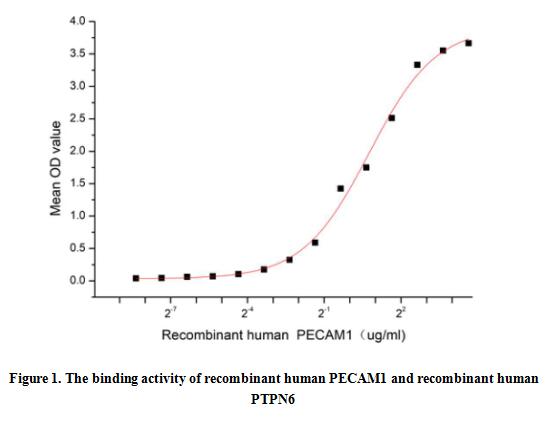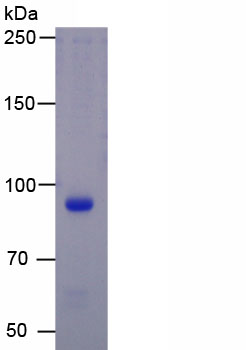Active Platelet/Endothelial Cell Adhesion Molecule (PECAM1)
CD31; EndoCAM; GPIIA'; PECA1
- Product No.APA363Hu61
- Organism SpeciesHomo sapiens (Human) Same name, Different species.
- Buffer FormulationPBS, pH7.4, containing 5% Trehalose.
- Traits Freeze-dried powder
- Purity> 95%
- Isoelectric Point7.1
- ApplicationsCell culture; Activity Assays.
- DownloadInstruction Manual
- UOM 10µg50µg 200µg 1mg 5mg
- FOB
US$ 144
US$ 360
US$ 720
US$ 2160
US$ 5400
For more details, please contact local distributors!
ACTIVITY TEST

Platelet/Endothelial Cell Adhesion Molecule (PECAM1), also known as CD31, is a transmembrane glycoprotein which belongs to the immunoglobulin superfamily. PECAM1 is widely expressed in various tissues, including blood vessels, the heart, lungs, and the brain and plays an important role in intercellular adhesion, cell migration, platelet function regulation and immune response.Abnormal expression of PECAM-1 is also associated with a variety of diseases, such as atherosclerosis, inflammation and blood diseases. Besides, Protein Tyrosine Phosphatase, Non Receptor Type 6 (PTPN6) has been identified as an interactor of PECAM1, thus a functional binding ELISA assay was conducted to detect the interaction of recombinant human PECAM1 and recombinant human PTPN6. Briefly, biotin-linked PECAM1 were diluted serially in PBS, with 0.01% BSA (pH 7.4). Duplicate samples of 100 ul were then transferred to PTPN6-coated microtiter wells and incubated for 1h at 37℃. Wells were washed with PBST 3 times and incubation with Streptavidin-HRP for 30min, then wells were aspirated and washed 5 times. With the addition of substrate solution, wells were incubated 15-25 minutes at 37℃. Finally, add 50 µl stop solution to the wells and read at 450 nm immediately. The binding activity of recombinant human PECAM1 and recombinant human PTPN6 was shown in Figure 1, the EC50 for this effect is 1.69 ug/mL.
USAGE
Reconstitute in 10mM PBS (pH7.4) to a concentration of 0.1-1.0 mg/mL. Do not vortex.
STORAGE
Avoid repeated freeze/thaw cycles. Store at 2-8°C for one month. Aliquot and store at -80°C for 12 months.
STABILITY
The thermal stability is described by the loss rate. The loss rate was determined by accelerated thermal degradation test, that is, incubate the protein at 37°C for 48h, and no obvious degradation and precipitation were observed. The loss rate is less than 5% within the expiration date under appropriate storage condition.
GIVEAWAYS
INCREMENT SERVICES
-
 BCA Protein Quantification Kit
BCA Protein Quantification Kit
-
 Molecular Mass Marker for Protein
Molecular Mass Marker for Protein
-
 Monoclonal Antibody Customized Service
Monoclonal Antibody Customized Service
-
 Polyclonal Antibody Customized Service
Polyclonal Antibody Customized Service
-
 Protein Activity Test Experiment Service
Protein Activity Test Experiment Service
-
 Electrophoretic Mobility Shift Assay (EMSA) Experiment Service
Electrophoretic Mobility Shift Assay (EMSA) Experiment Service
-
 Buffer
Buffer
-
 Lentivirus Packaging Experiment Service
Lentivirus Packaging Experiment Service
-
 Adenovirus Packaging Experiment Service
Adenovirus Packaging Experiment Service
-
 Real Time PCR Experimental Service
Real Time PCR Experimental Service
-
 Spike RBD Protein (S-RBD)
Spike RBD Protein (S-RBD)
-
 Protein G
Protein G
-
 Protein A
Protein A
| Magazine | Citations |
| BioMed research international | Endothelial gene expression and molecular changes in response to radiosurgery in in vitro and in vivo models of cerebral arteriovenous malformations Pubmed: 24199192 |







